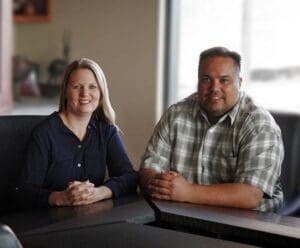Lodestar is defined as a star showing the way, accurately describing Sarah and Derek Schwitters’ digital marketing firm, lodestar marketing group. Based in the Pacific Northwest, lodestar guides clients in all aspects of digital marketing – search engine marketing (SEM), search engine optimization (SEO), social media, design and development.
Like the start of many small business stories, digital marketing experts Sarah and Derek saw a need and positioned themselves to fill it. Both were successful marketing professionals in the late 90s when Google Analytics, pay-per-click, and keyword searches were new concepts. Married since 1997 and living in the Seattle area, the team had strong success in the marketing field while working with other companies and partners.
As they delved into the digital realm, they realized that the larger agencies weren’t meeting clients’ needs and demands for this fresh new area of marketing, so in 2004 Derek made the jump to freelance consulting and launched lodestar marketing group with an emphasis on digital campaigns. Sarah joined the company in 2009.
 After landing their first major client, Derek had the golden opportunity to work with Google during the early years of SEM, which meant a lot of beta testing with generous budgets, and learning from the beginning what worked and what didn’t in digital. Derek said they consider themselves quite fortunate to have had that early learning experience with Google, which helped shape their company’s focus.
After landing their first major client, Derek had the golden opportunity to work with Google during the early years of SEM, which meant a lot of beta testing with generous budgets, and learning from the beginning what worked and what didn’t in digital. Derek said they consider themselves quite fortunate to have had that early learning experience with Google, which helped shape their company’s focus.
The Schwitters operated their business out of their home for the first eight years, but when the business started expanding, it was clear it was time to reclaim their dining room table and move their day-to-day operations to a separate office space.
Competing for business in a crowded marketplace meant the Schwitters had to strategize and determine how to stand out and show their unique value when going up against major agencies with supposedly shinier bells and louder whistles. After 11 years in business, the Schwitters have honed their methods and found their place. The result? They often win accounts over their larger, more well-known agencies.
We talked with Sarah and Derek, who shared five strategies that were instrumental in growing their business and competing with larger competitors.
Invest time in client relationships.
The Schwitters say this is a major difference between their business and the larger firms.“People want to do business with people they know, like, and trust, so creating genuine relationships with clients and vendors is one of the most important aspects of building our business. Once we understood this and began nurturing our client relationships, we saw incremental revenue increase from current clients and retention rates skyrocket,” Sarah says. They build relationships by regularly meeting clients in person to review campaigns, strategies, and results. Derek says, “We make every effort to meet clients as a team, which is important because we demonstrate our commitment to the client by taking time for them.”
Keep your service personal instead of corporate.
“We offer our clients a very personalized service, not a cookie-cutter solution. We go in and work to understand the client’s situation – their business goals, what they’re currently doing, and what they need, from an objective viewpoint. We know the recommendations we give will impact their business, and no business is the same,” Sarah says. Derek emphasizes that their clients get their time and expertise. “Often large agencies will send their top sales team to meet with a client to close the deal, and then will assign the account a junior account rep with less experience,” he says. “With us, we are the principles – there aren’t multiple layers of management. We personally create the strategies for our clients. The big agencies usually can’t provide this level of service.”
Make everything transparent.
“Trust is a huge component in building a successful business,” Sarah says. “We believe that to earn trust, we must be completely transparent with our clients. For example, many agencies mix management and media fees, leaving the client unsure of what they are actually receiving in advertising exposure. This is just one area where we wanted to do things differently.“We apply this philosophy of complete transparency to all parts of our service, and by being honest and open with our clients, we have established trust and have seen significant growth and referrals.”
Know and communicate your value.
The Schwitters made the common mistake early in their business of undervaluing their service. Over time, having confidence in what they offer and the fees they charge has actually increased business, not lessened it.“When we first started, we were ‘wishy-washy’ with our pricing. We wanted to win business and didn’t want our proposals to come in too high. We often said things like, “…we’re flexible,” or “We’ll work with your budget.” We found that this led to confusion and ultimately to not winning the business. Once we determined our sweet spot of fair, competitive prices for our services and stated them confidently, we won more business.
Learn to say no.
“We used to try to be all things to all clients during our growing phase,” Sarah says. “We’d say “yes” a lot, but taking on every request actually hindered our growth and effectiveness. We were distracted from what we’re really good at.” Zeroing in on becoming digital marketing experts has fueled exponential growth. Since learning to say no, they’ve nearly doubled in size from 2013 to 2015. By focusing on the work they enjoy, Sarah said it has also allowed them more time to maintain a healthy work-life balance and to enjoy family life with their children.
Takeaway:
After 11 years in business, the lodestar marketing group has learned valuable lessons about how to grow a rewarding, successful business: develop tangible relationships with clients; give personalized service whenever you can; develop trust by being transparent; be confident in your pricing; and don’t try to be all things to all clients.
This article was originally featured on Kabbage.com.
